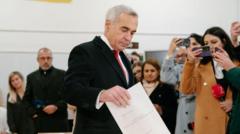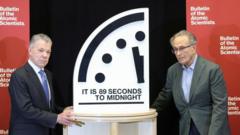In a surprising turn of events, Romania's constitutional court has annulled the results of the first round of the presidential election, sparking a constitutional crisis just ahead of the scheduled second round of voting. The court's decision comes in light of declassified intelligence documents alleging foreign interference influencing the original vote outcome.
Romanian Court Overturns Presidential Election Results Amid Controversy

Romanian Court Overturns Presidential Election Results Amid Controversy
Romania's electoral crisis deepens as court annulment leads to re-election plans.
The court's ruling means that all electoral processes will be restarted, with the government tasked with setting a new election date. Calin Georgescu, a little-known far-right candidate who won the first round, has become both a focal point of turmoil and a vocal critic of the decision. He has branded the ruling a "formalised coup d'etat" and maintains his intent to pursue his candidacy again, although it’s uncertain whether he can participate in a re-run.
Prime Minister Marcel Ciolacu endorsed the court's decision as a necessary response to revealed election meddling linked to Russian strategies. The declassified documents reveal that Georgescu was allegedly a beneficiary of an expansive foreign influence operation.
Current President Klaus Iohannis announced he will continue in his role until a new president is elected and reaffirmed Romania's commitment to NATO and the European Union, framing the court's decision as a matter of "national security."
Elena Lasconi, the runner-up in the disbanded first round, fiercely criticized the ruling as undermining democracy. Lasconi emphasized that millions of Romanians' votes should not be disregarded. Georgescu's controversial rise, fueled by TikTok campaigning and allegations of preferential treatment, has raised questions about the integrity of the electoral process.
The political landscape in Romania is now uncertain, with significant questions ahead about the future of its leadership and electoral integrity.
Robert Cristian, a political analyst, expressed concerns that this electoral turmoil could affect Romania's foreign relations and internal stability, as many citizens grapple with feelings of disenfranchisement in the wake of the court's decision.
The path forward remains foggy, as the nation prepares for another chapter in its tumultuous electoral history.
Prime Minister Marcel Ciolacu endorsed the court's decision as a necessary response to revealed election meddling linked to Russian strategies. The declassified documents reveal that Georgescu was allegedly a beneficiary of an expansive foreign influence operation.
Current President Klaus Iohannis announced he will continue in his role until a new president is elected and reaffirmed Romania's commitment to NATO and the European Union, framing the court's decision as a matter of "national security."
Elena Lasconi, the runner-up in the disbanded first round, fiercely criticized the ruling as undermining democracy. Lasconi emphasized that millions of Romanians' votes should not be disregarded. Georgescu's controversial rise, fueled by TikTok campaigning and allegations of preferential treatment, has raised questions about the integrity of the electoral process.
The political landscape in Romania is now uncertain, with significant questions ahead about the future of its leadership and electoral integrity.
Robert Cristian, a political analyst, expressed concerns that this electoral turmoil could affect Romania's foreign relations and internal stability, as many citizens grapple with feelings of disenfranchisement in the wake of the court's decision.
The path forward remains foggy, as the nation prepares for another chapter in its tumultuous electoral history.





















